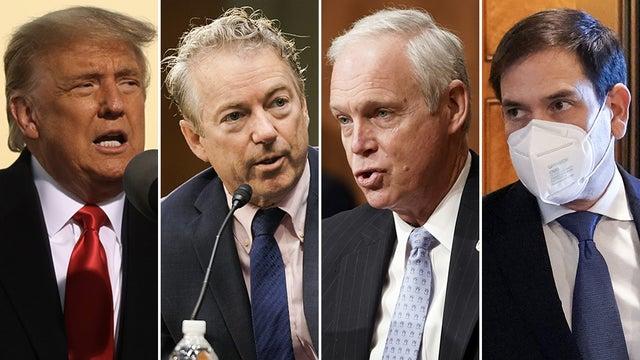
Former President Trump‘s recent endorsements of Sens. Ron Johnson (R-Wis.), Rand Paul (R-Ky.) and Marco Rubio (R-Fla.) are exposing a rift between Republicans who want to leave the Trump era behind and those who see his populist brand of conservatism as a winning formula.
By dropping a string of Senate endorsements almost 20 months before Election Day, Trump is inserting himself squarely in the internal debate among GOP lawmakers about where they want to go as a party and how closely they want to work with President Biden.
He is also sending signals to allies that he can protect them from primary challenges next year, a potentially strong incentive for fellow Republicans not to discard his legacy.
“It’s a great preemptive thing to put off any potential challengers,” said Jim McLaughlin, a Republican strategist, who noted that Trump has a “very good relationship” with Sen. Rick Scott (Fla.), head of the Senate GOP’s campaign arm.
McLaughlin said Trump’s growing interest in the early machinations of the 2022 election cycle will similarly send a message to Republicans that “they need to fight against” Biden’s agenda, which aims in large part to dismantle the previous administration’s policies.
Some GOP senators, like Sens. Susan Collins (Maine), Lisa Murkowski (Alaska) and Mitt Romney (Utah), say they want to work with Biden. They were part of a group that met with the president in early February to explore a compromise coronavirus relief package. But Biden quickly dismissed their proposal as being insufficient.
In the end, not a single congressional Republican voted for Biden’s $1.9 trillion American Rescue Plan.
Some Republican lawmakers see Trump’s departure from the White House as a chance to break with certain policies that were broadly unpopular in the Senate GOP conference. Among those were Trump’s approach to trade and foreign policy.
Republican lawmakers haven’t yet decided whether they want to renounce Trump’s trade and tariff practices, and Biden is keeping them in place for now.
On foreign policy, there hasn’t been much pushback from the Senate Republican Conference over Biden’s decision to mend fences with NATO allies. The president strongly reaffirmed the U.S. commitment to NATO in February by declaring: “An attack on one is an attack on all. That is our unshakeable vow.”
But for other Republicans, Trump’s out-of-office support is fuel to propel their own careers and expand the GOP base among working-class voters. GOP strategists note that Johnson, Paul and Rubio all wanted Trump’s endorsement.
Sen. Josh Hawley (R-Mo.) is among the handful of Republican senators who have embraced Trump’s populism and see it as the future of the party.
Hawley says he will unveil “a trust busting agenda for [the] 21st century” this week focused on “giant woke corporations” that “keep telling Biden’s big lie about Georgia.”
That agenda isn’t sitting well with all conservatives.
“I agree with the sentiments right up until he advocates for a policy that is anti-free market,” said Brian Darling, a GOP strategist. “The one thing Republicans have to resist more than anything is the urge to use antitrust laws to hit back at these corporations they disagree with.”
Hawley also broke with much of the GOP conference last year by endorsing $2,000 stimulus checks in what became a $900 billion compromise measure passed by Congress in December. Trump also favored sending out $2,000 checks, but many Republicans balked at the idea.
At the other end of the spectrum is Murkowski, who wants the GOP to return to being the “big tent” party that it was under President Reagan.
“If the Republican Party continues to be the party of Trump, I’m not quite sure where I fit,” she said in January.
She got a boost Friday when the Senate Leadership Fund, a super PAC linked to Senate Minority Leader Mitch McConnell (R-Ky.), endorsed her for reelection in 2022.
“Alaska needs the kind of experienced representation that Lisa Murkowski provides in the United States Senate,” said the group’s president, Steven Law, who formerly served as McConnell’s chief of staff.
McConnell has broken with Trump since he lost to Biden. The GOP leader stopped speaking to the president in mid-December and in February denounced his role in inciting the mob of supporters who stormed the Capitol on Jan. 6 while lawmakers were tallying the Electoral College vote.
Trump has been relatively quiet since being banned from Twitter in early January. But he has made his presence in Republican politics increasingly felt in recent days with a series of statements and endorsements from his post-presidential office and his Save America PAC.
The PAC has raised $85 million to bolster Trump’s most loyal allies, a reminder to fellow Republicans that he intends to remain a political force.
This past week he endorsed Johnson, Paul and Rubio, three of his most loyal Senate allies, who are up for reelection next year. Johnson, who spearheaded an inquiry into Hunter Biden’s work for a Ukrainian energy company — a favorite Trump topic — hasn’t announced yet whether he’ll seek a third term.
Trump urged Johnson to “Run, Ron, Run!” even though Democrats think they might have a better chance of winning the seat if he’s the GOP nominee.
“I hope he does run. It makes it easier for the Democrats to pick it up. He’s been so radical and outrageous on so many issues recently that I think it makes an easier pick up for Democrats if he’s in,” said Ben Nuckels, a Democratic strategist who helped Wisconsin Gov. Tony Evers (D) win in 2018.
Brandon Scholz, a Republican strategist based in Wisconsin, predicted Democrats will reprise the anti-Trump tactics and rhetoric they deployed in 2020.
He said Trump’s endorsement “certainly is going to work for the Democrats, who are trying to create the same campaign that they ran against Donald Trump in the presidential race against Ron Johnson.”
Democrats didn’t run an issues-based campaign against Trump in Wisconsin, Scholz said, but instead ran one focused on his character and behavior.
“They hated Donald Trump — that is what the campaign was about,” he said. “My sense is they’re trying to recreate that campaign.”
Via The Hill


